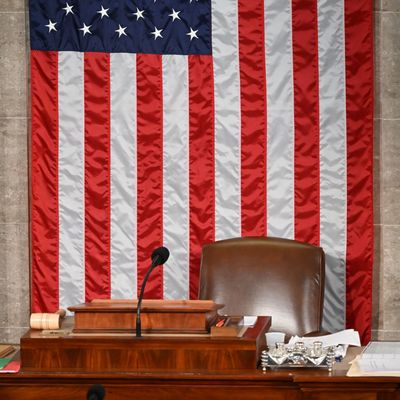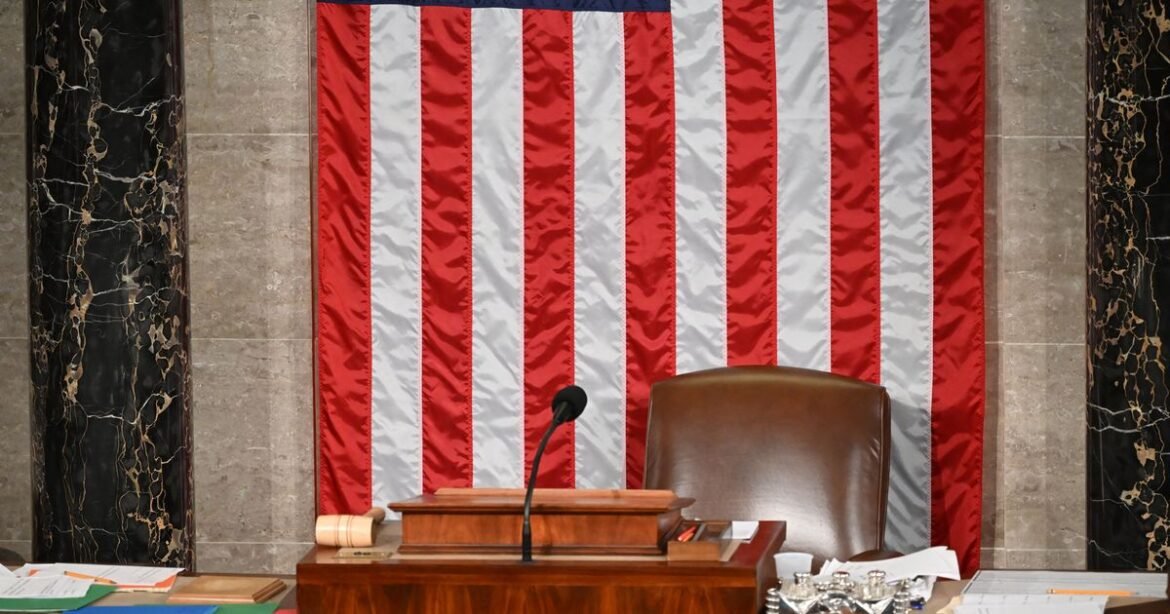
A House with nobody home.
Photo: SAUL LOEB/AFP via Getty Images
With the removal on October 20 of Jim Jordan as House Republican Speaker-Designate (the GOP conference’s nominee to become Speaker), replacing previous House Speaker-Designate Steve Scalise, who in turn sought to succeed actual House Speaker Kevin McCarthy, there’s absolutely no way to tell who if anyone will be able to muster the 217 votes necessary to seize the slippery gavel that McCarthy was forced to relinquish on October 3. The list of possible aspirants keeps growing:
Since any five House Republicans can veto any of these would-be Speakers, the proliferation of possible candidates is likely to breed enough dissension to veto them all. Maybe a combination of embarrassment and exhaustion will force the squabbling congressmen to agree on someone, but even then, the availability of a motion-to-vacate-the-chair (the device used to defenestrate McCarthy) could make the next Speaker’s tenure breathtakingly short.
The extreme instability of the situation means it may be a good idea to look at what would happen if the House is Speakerless for an extended period of time.
Technically the House has a Speaker Pro Tem, Patrick McHenry, placed in that position by his close friend McCarthy to ensure someone would be in place to oversee the election of a successor. So far McHenry has resisted any talk of expanding his powers beyond that extremely limited role, and more to the point, the same conservatives who dumped McCarthy (not to mention backers of other would-be Speakers) are sure to block any back-door accession to power by the former Speaker’s sidekick. In theory a small group of Republicans could cut a deal with Democrats to empower McHenry or some other Speaker Pro Tem (or even an actual Speaker), but this kind of betrayal would produce an explosion among conservatives that would paralyze the House even more than the absence of a permanent presiding officer.
So barring some unforeseen development, a Speakerless House will be unable to undertake any legislative activity whatsoever.
This is a completely unprecedented situation. Yes, there have been periods when the death or resignation of a Speaker left the chair unoccupied. And long before it took McCarthy 15 ballots to win the job at the beginning of a congressional session, an antebellum Congress took 44 ballots to make William Pennington its presiding officer. But vacant Speaker’s chairs have always occurred between or at the beginning of congressional sessions, not months into an interrupted work schedule. So there will be consequences.
Fortunately, much of what the House might be doing if it was a functioning legislative body won’t be missed. Because the Senate and the White House are controlled by Democrats, most House business during this session has either involved partisan “messaging” bills that won’t get within a million miles of becoming law, or completely noncontroversial symbolic and housekeeping measures that can wait or simply go undone. Committees can still meet (assuming their members aren’t constantly on the floor or in conference meetings trying to name a Speaker), but can’t issue subpoenas or accept or refer any legislation.
The one critical piece of business that the House must deal with is annual appropriations, the measures required to authorize all but the most essential government spending. Right now the federal government is operating under a stopgap spending bill which was the immediate cause of McCarthy’s demise after he negotiated it with the Biden administration and Senate Democrats and then passed it in the House with more Democratic than Republican votes. It expires on November 17. Even if there is a Speaker by then the House won’t have time to enact (and negotiate with the Senate) the individual appropriations bills conservatives have insisted on instead of the larger “omnibus” bills customarily used to keep the government running. And it’s hard to imagine the next Speaker signing onto another stopgap measure given what happened to McCarthy. Without a Speaker or some sort of special bipartisan arrangement, a government shutdown on November 17 is certain, and the government will remain shut down until such time as the House can conduct business again.
Aside from the government operations covered by the stopgap spending bill, there are “emergency” appropriations regularly entertained by Congress, usually at the president’s initiation. In his televised address on October 19, Joe Biden made it clear he would be asking for quick action on additional aid to Israel and Ukraine, and the White House subsequently indicated it wanted new funding for certain domestic priorities, including the border security needs that are a subject of sharp contention between the two major parties. None of this can happen with the House unable to act, and again, any special arrangement to consider one legislative item but not another could be wildly controversial within the fractured House Republican conference.
It’s tempting to say that a Speakerless House might not be that different from a House theoretically operated by a powerless Speaker, which is what Kevin McCarthy ultimately became. But appearances matter, and the disarray House Republicans display to the world by their inability to choose a leader will at some point begin to affect their electoral prospects for 2024.
Let’s say Republicans decide the stakes in who controls the House are so high that they are willing to risk the spectacle of a Speakerless chamber, or they find ways to deal with the most urgent items of business with no more than a temporary figurehead in the chair. The gridlock could drag into 2024 with a new set of fiscal deadlines and untold emergencies arising at home and abroad. The only absolute deadline is the end of this Congress in early January of 2025. You have to figure, however, that a leaderless House Republican team would not fare well in the 2024 elections. So their warring tribes will have to make peace before a frustrated public finally decides just one party is primarily to blame for the dysfunctional arrogance and myopia they perceive in Washington.

